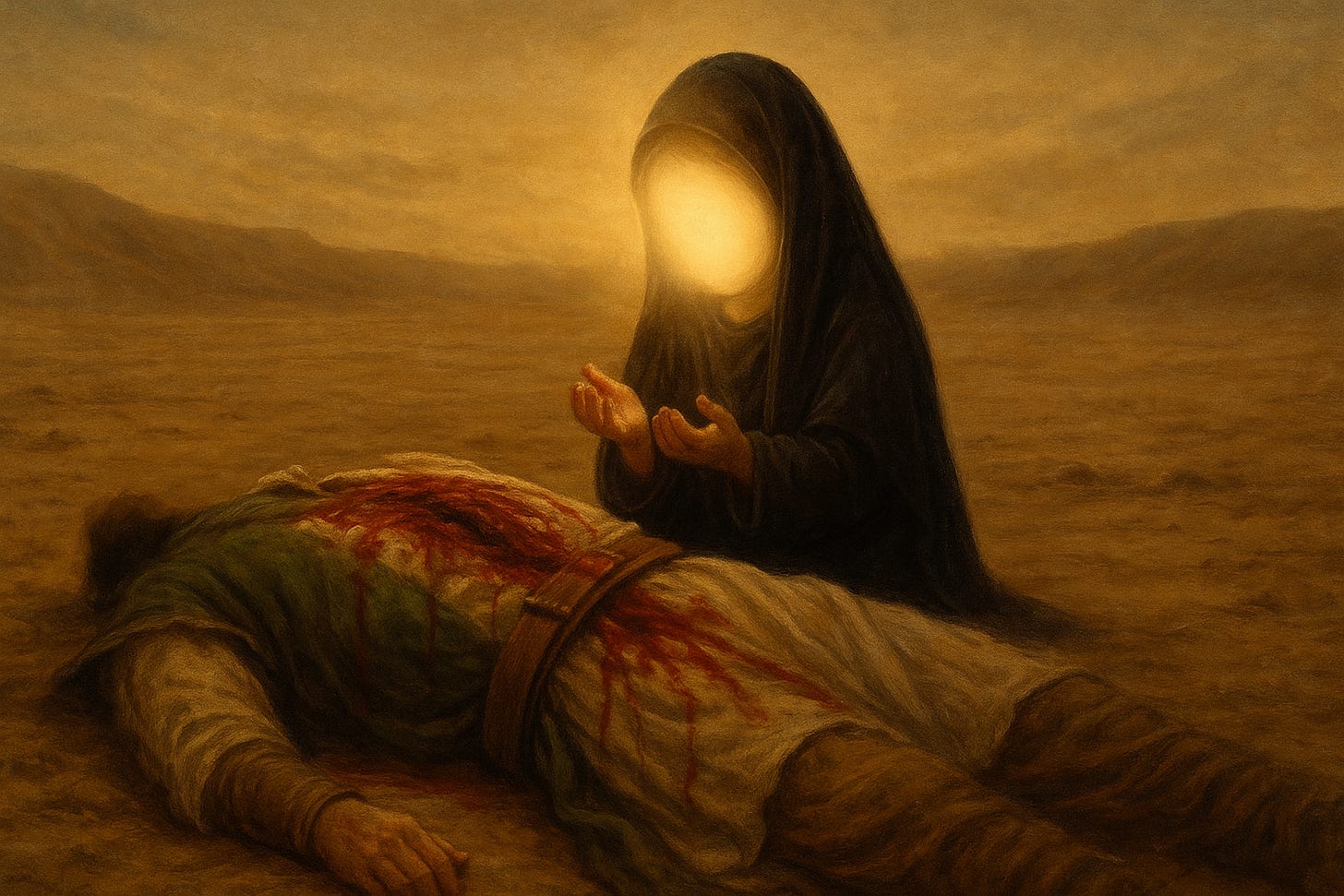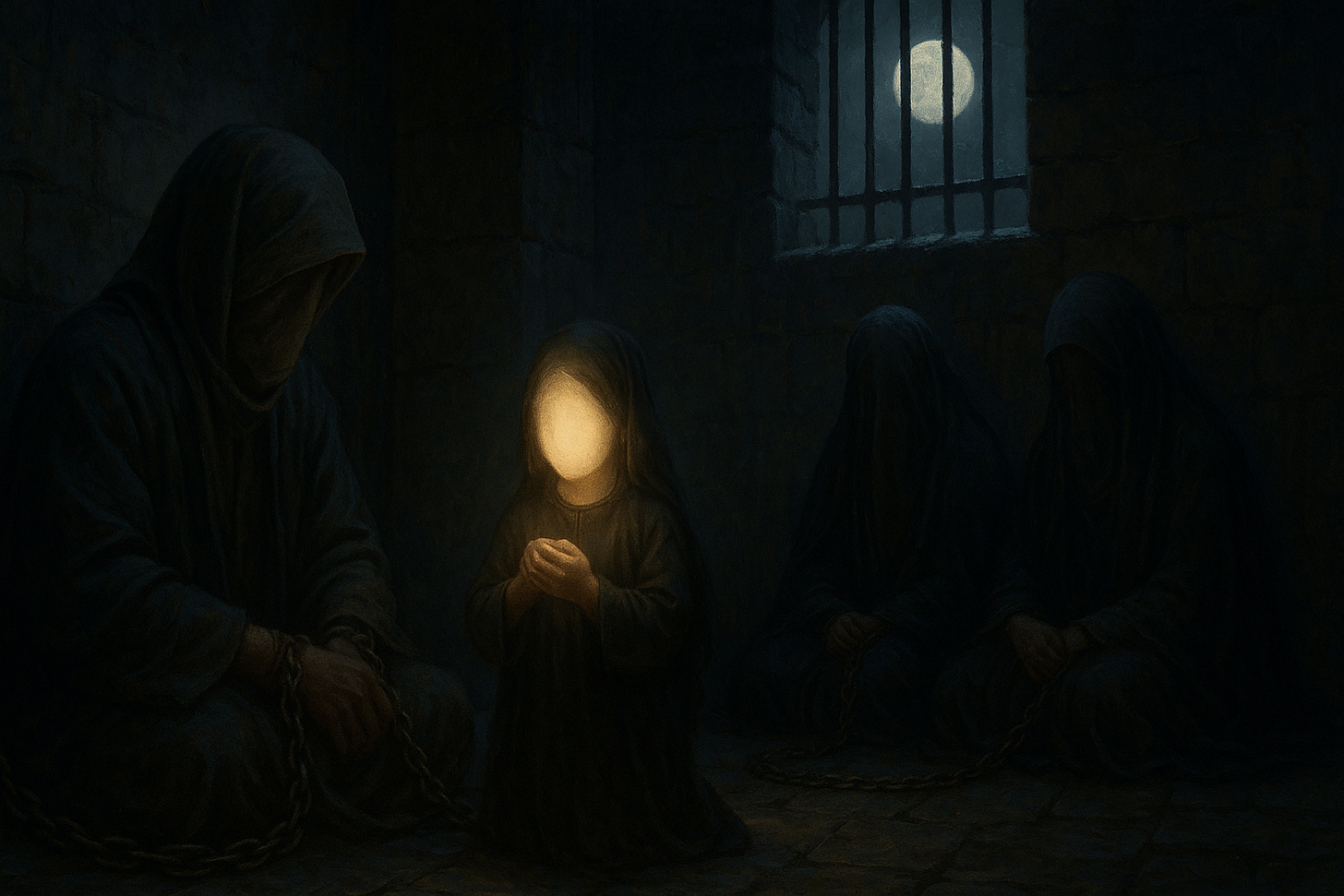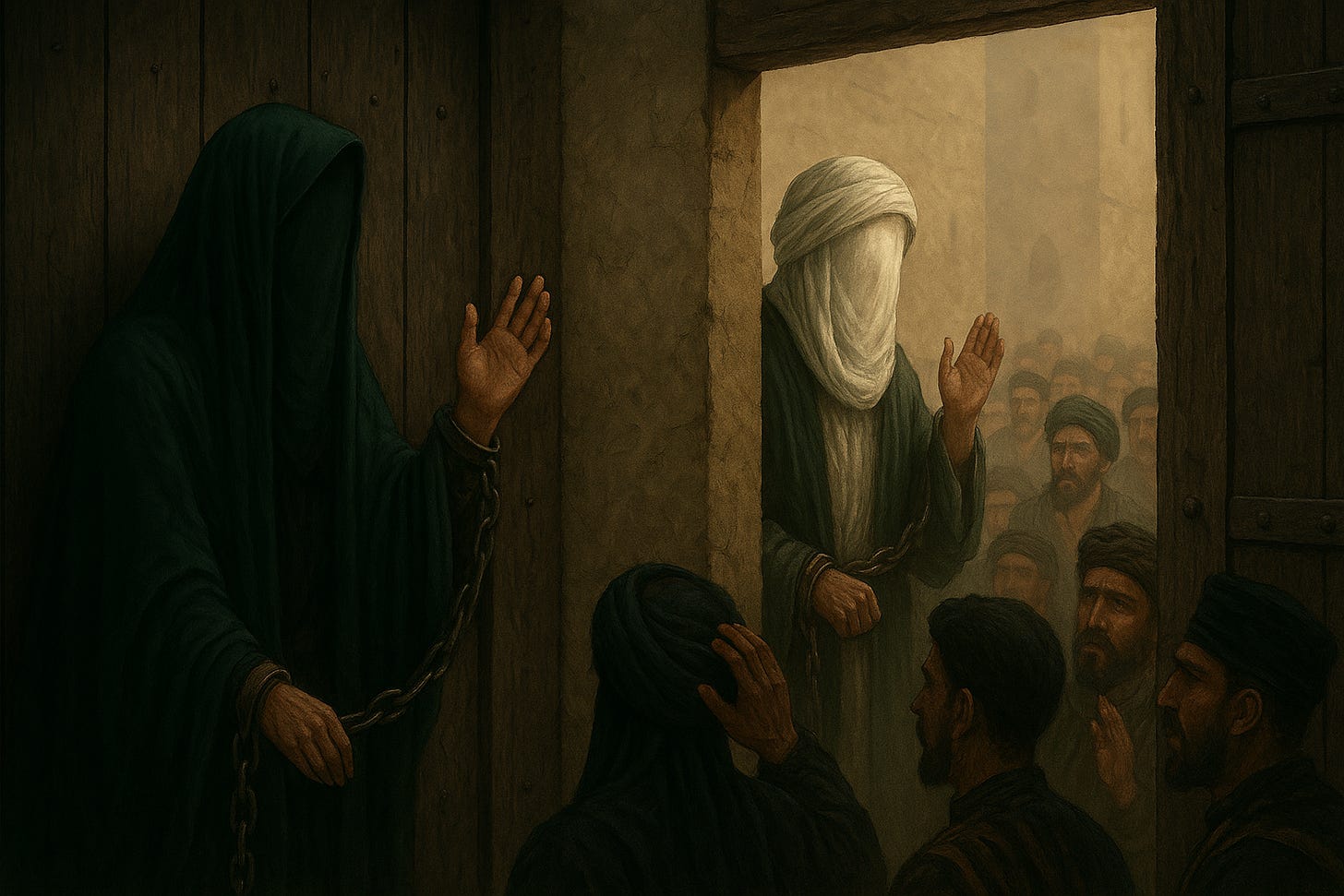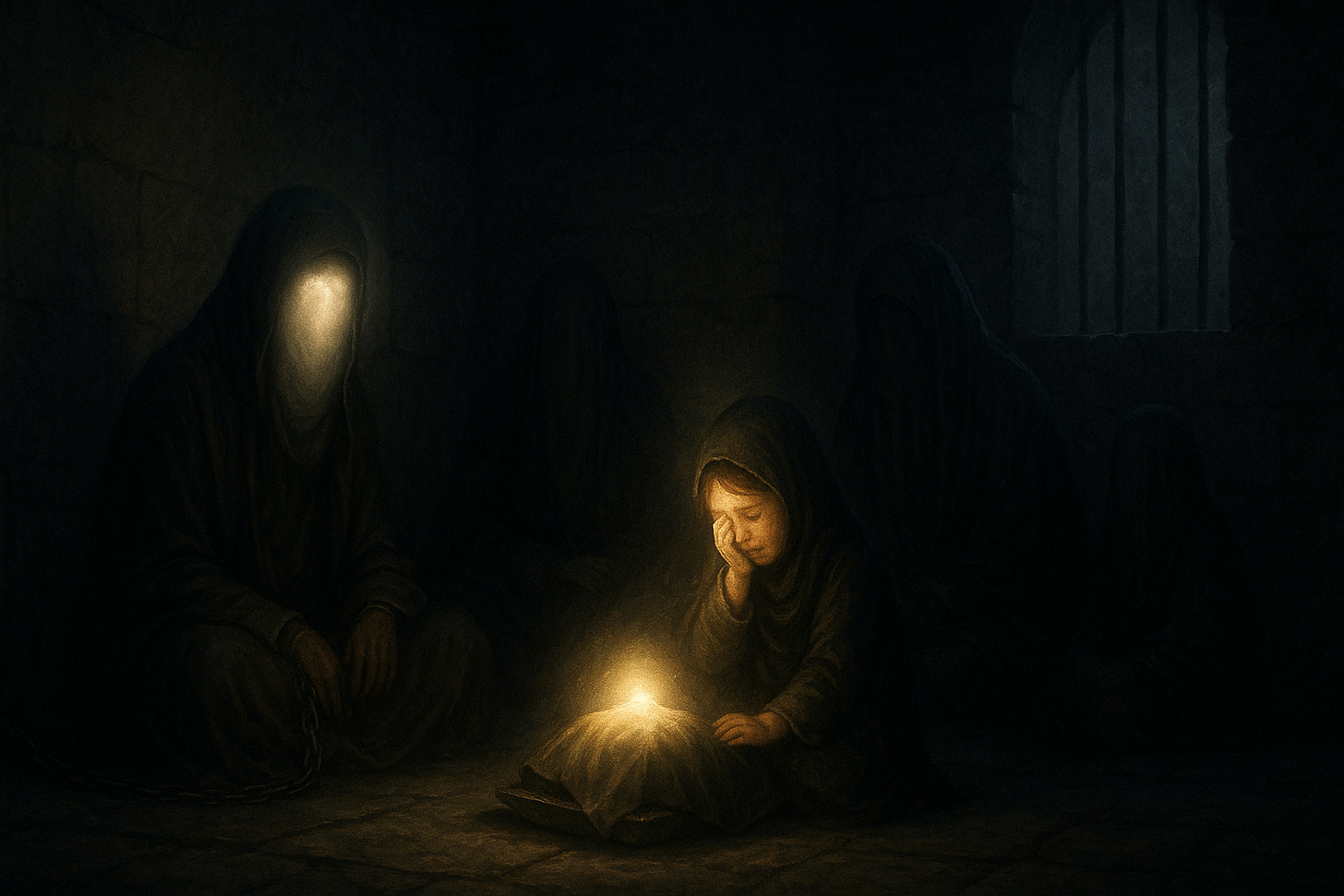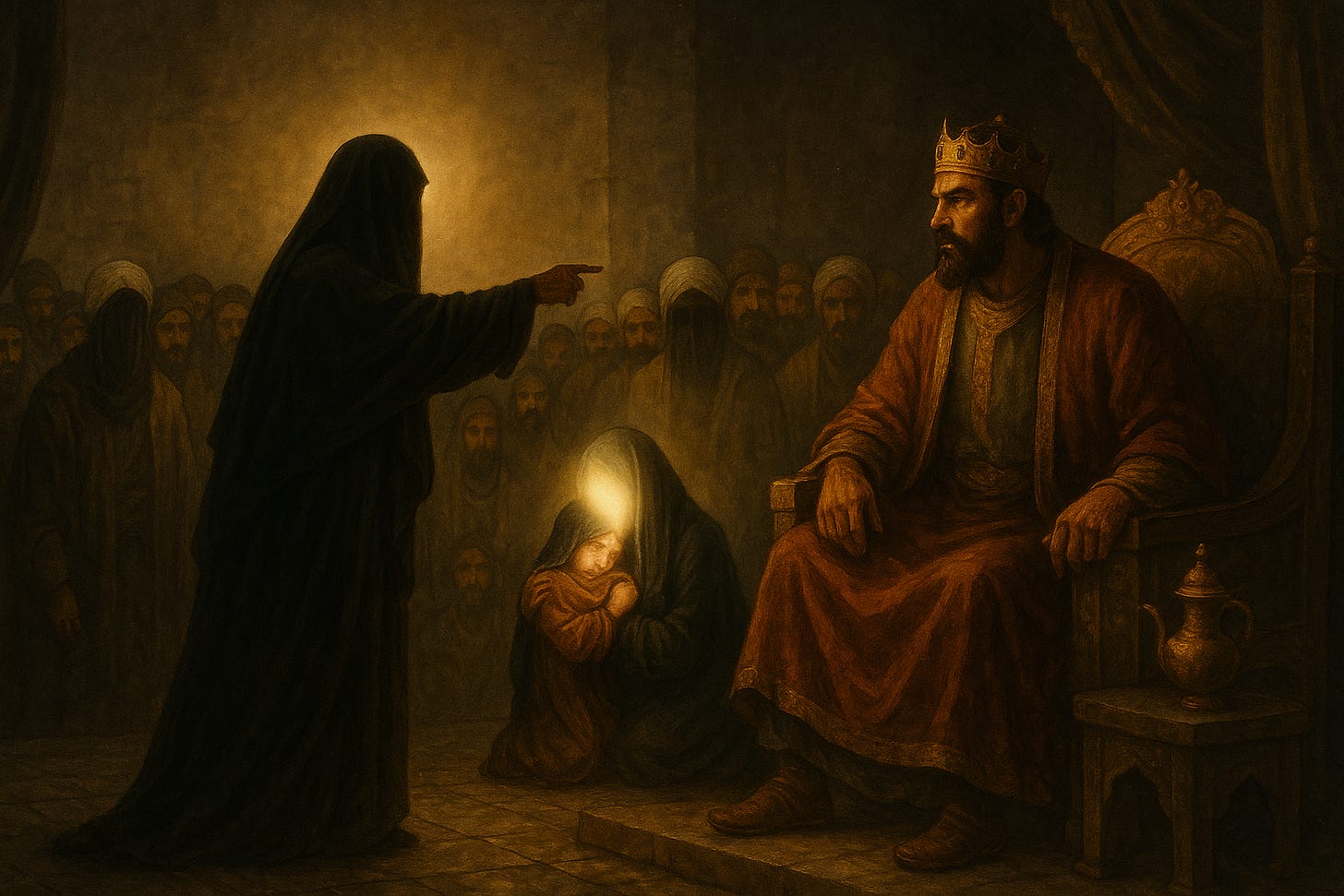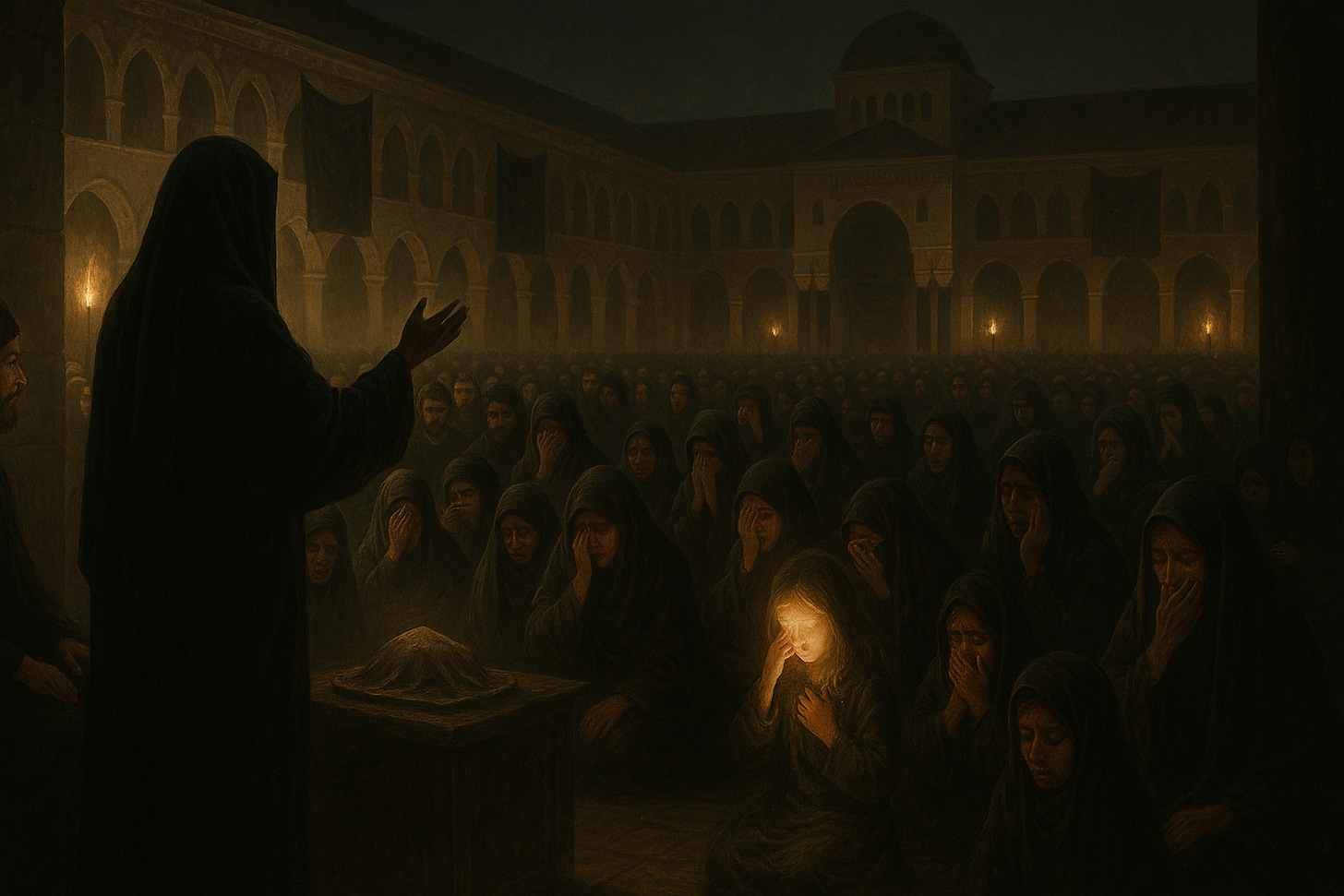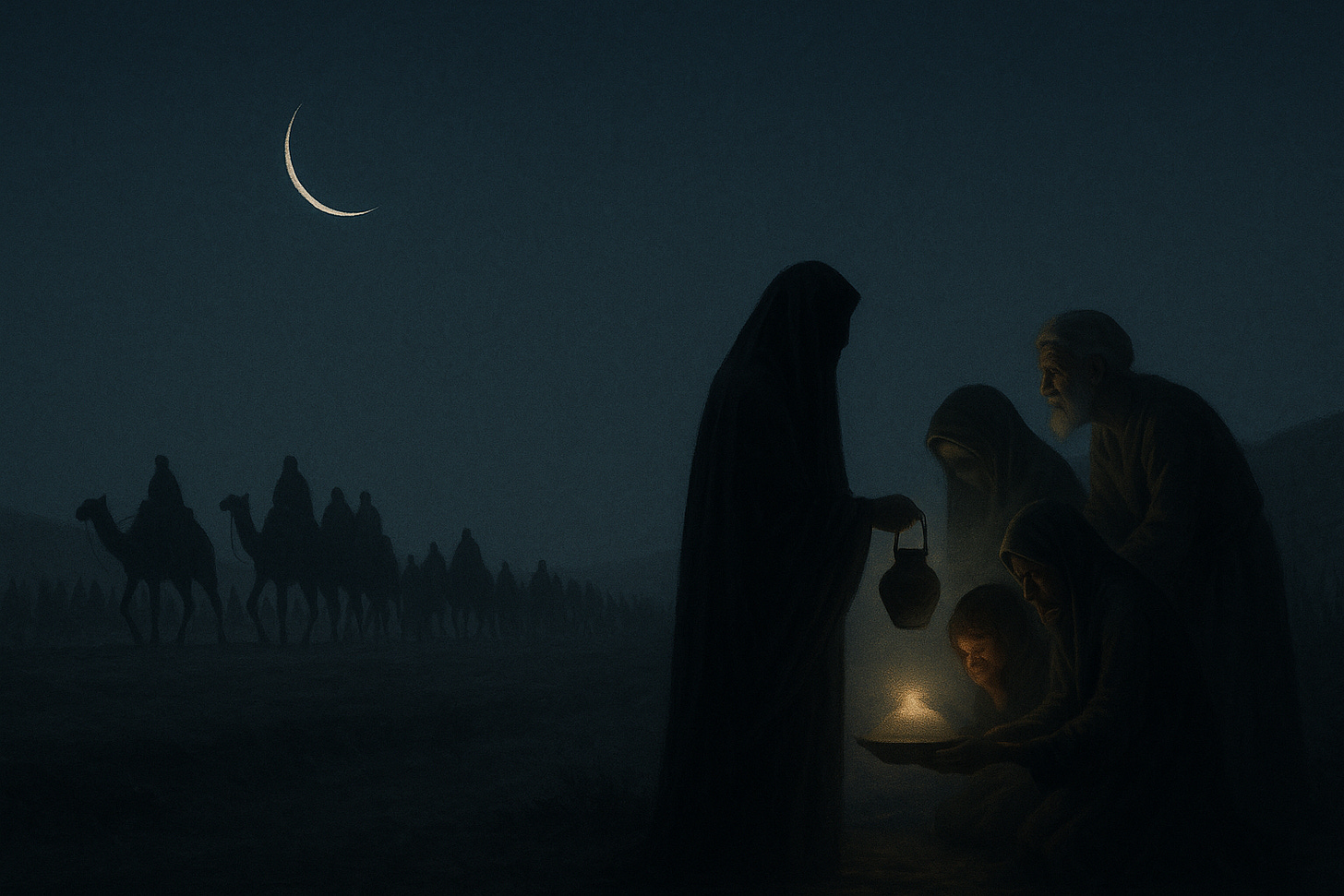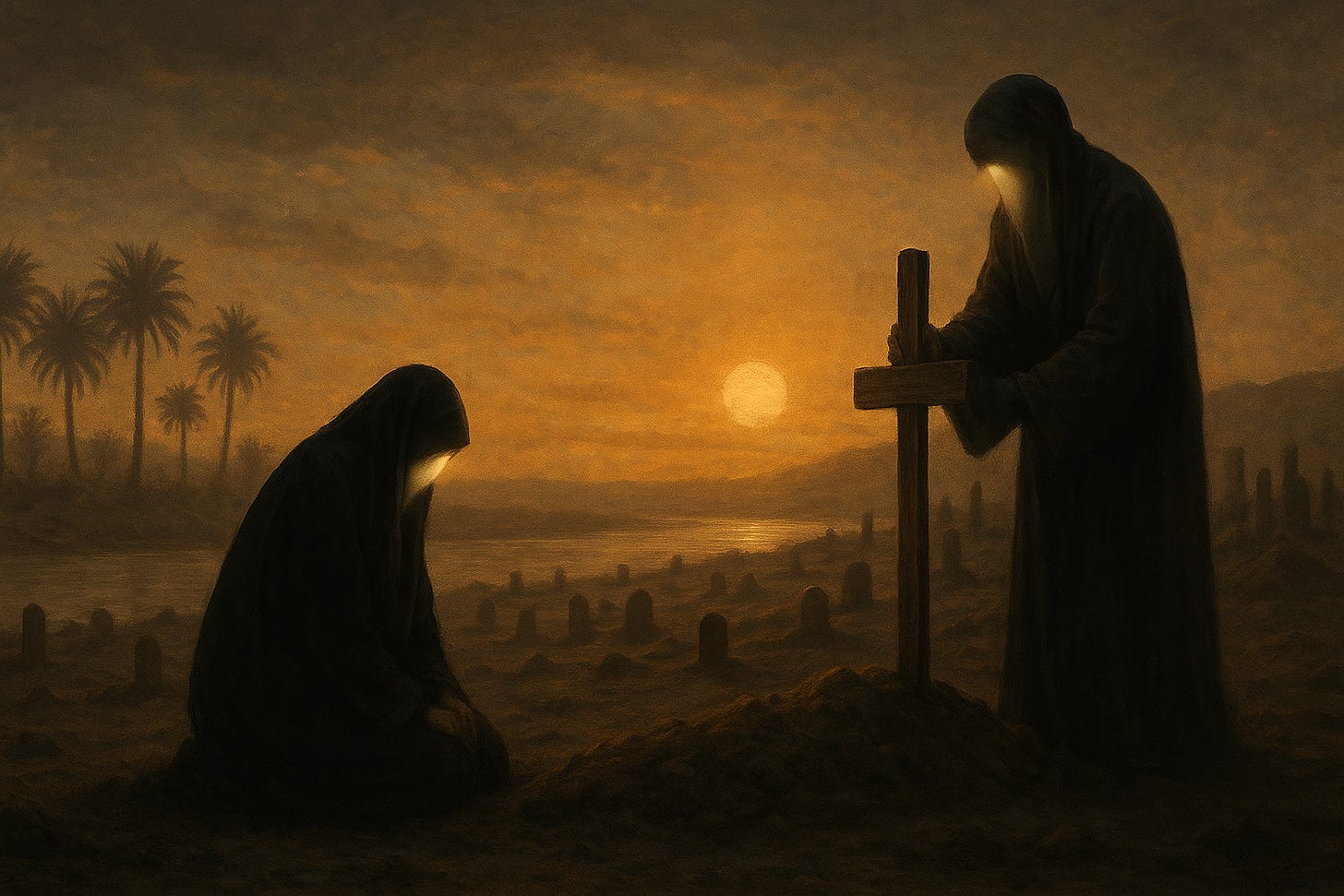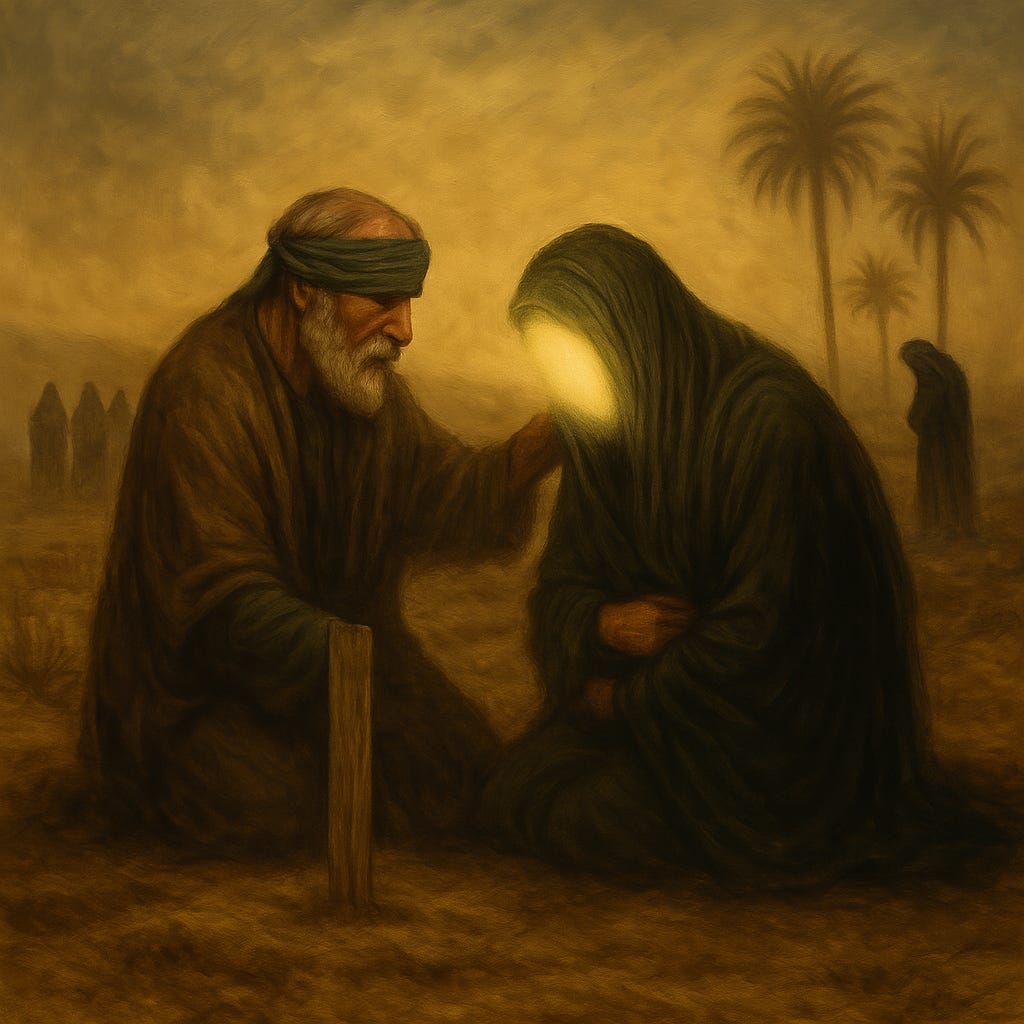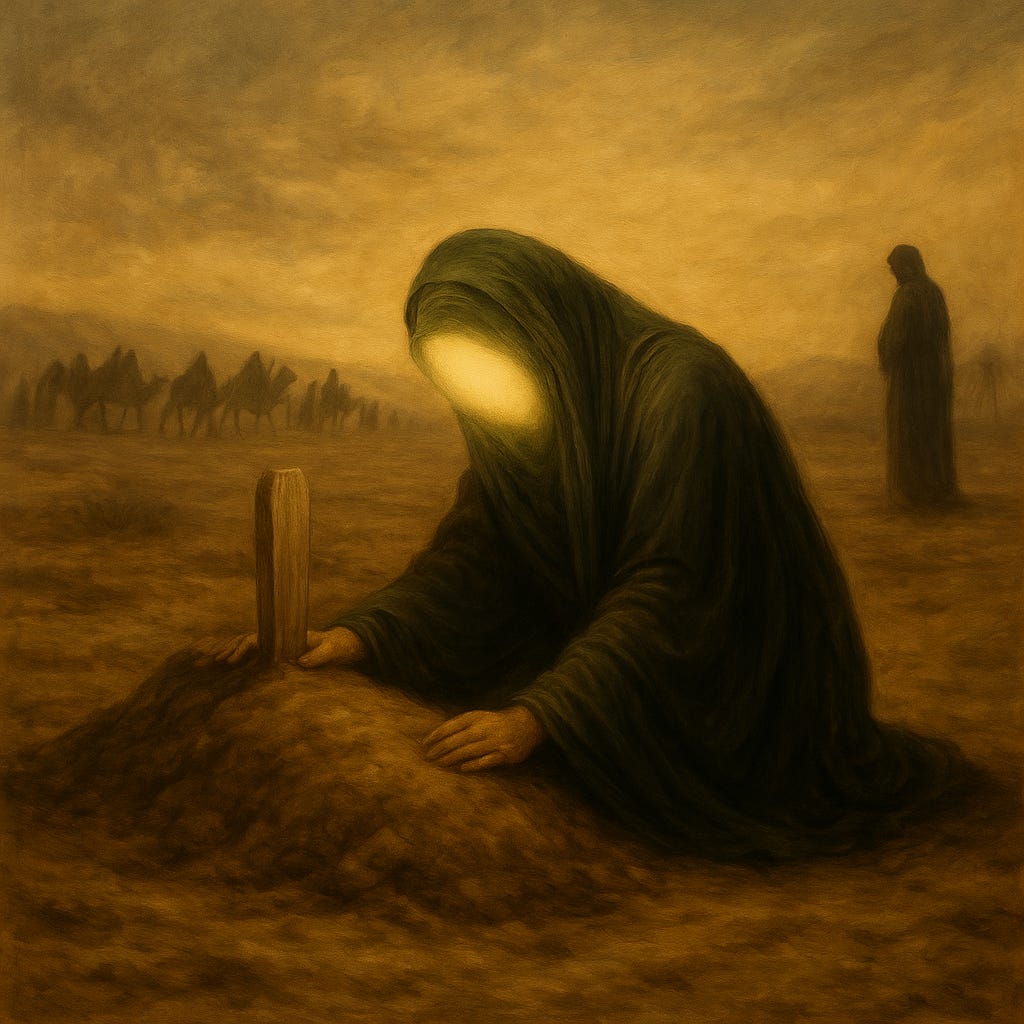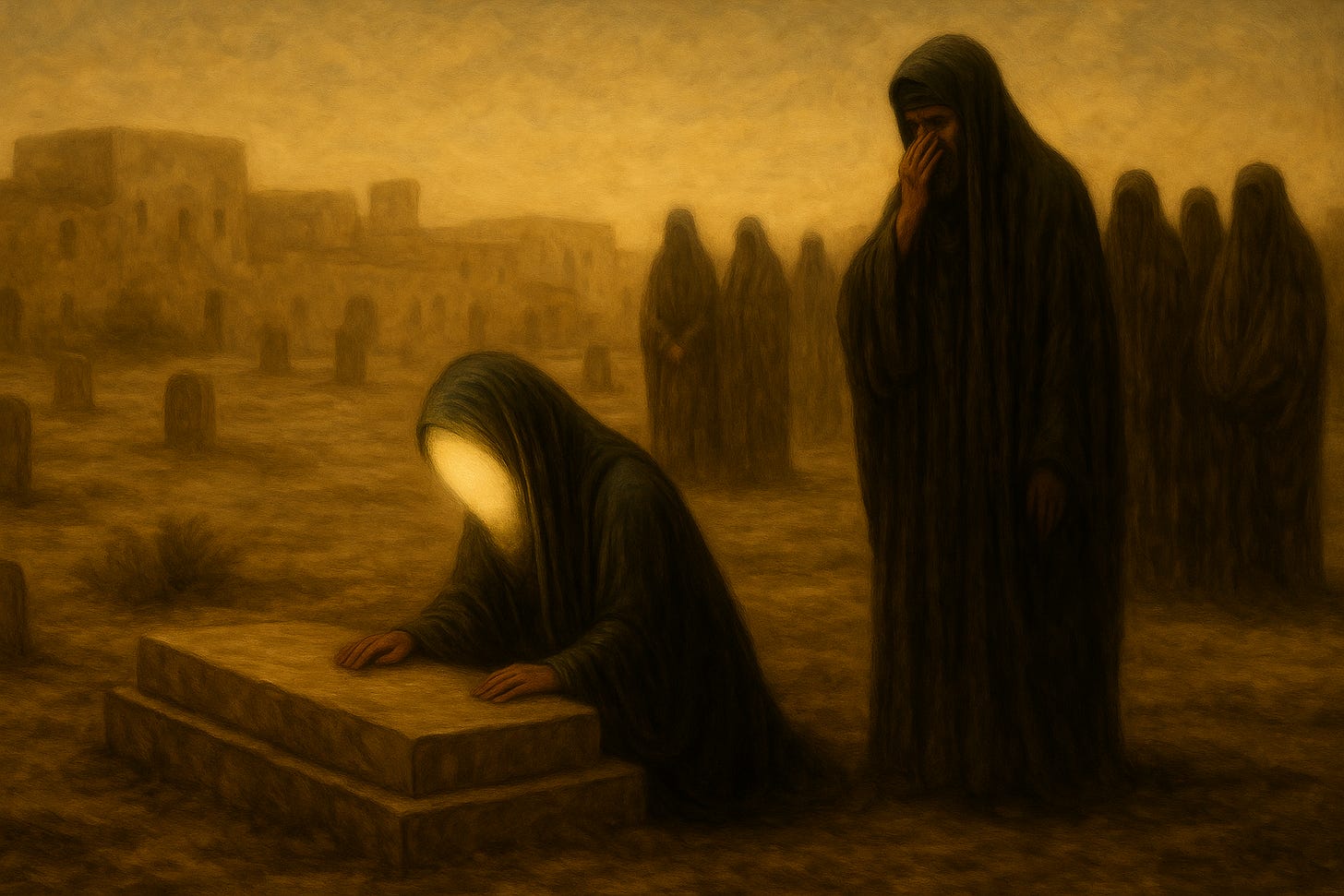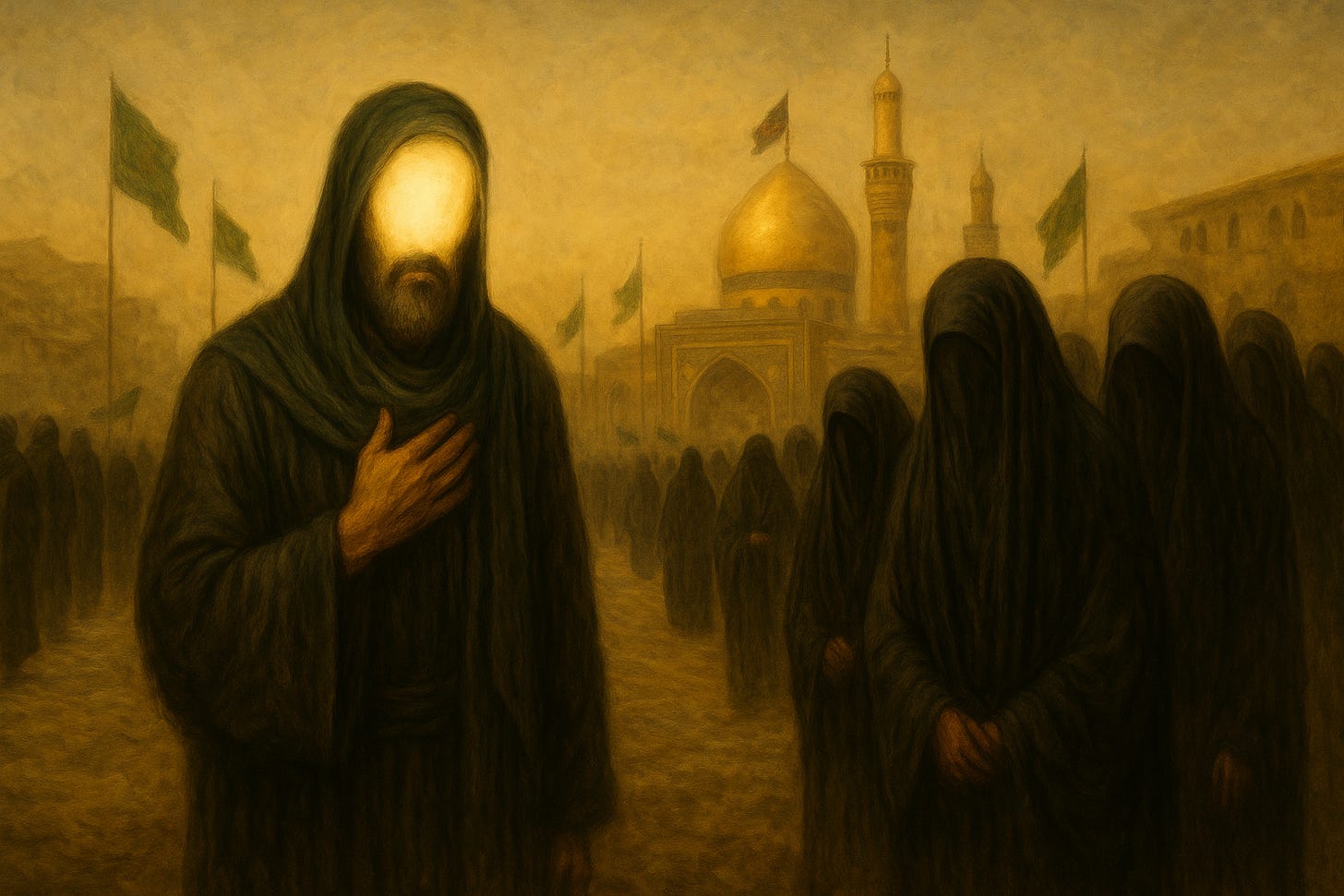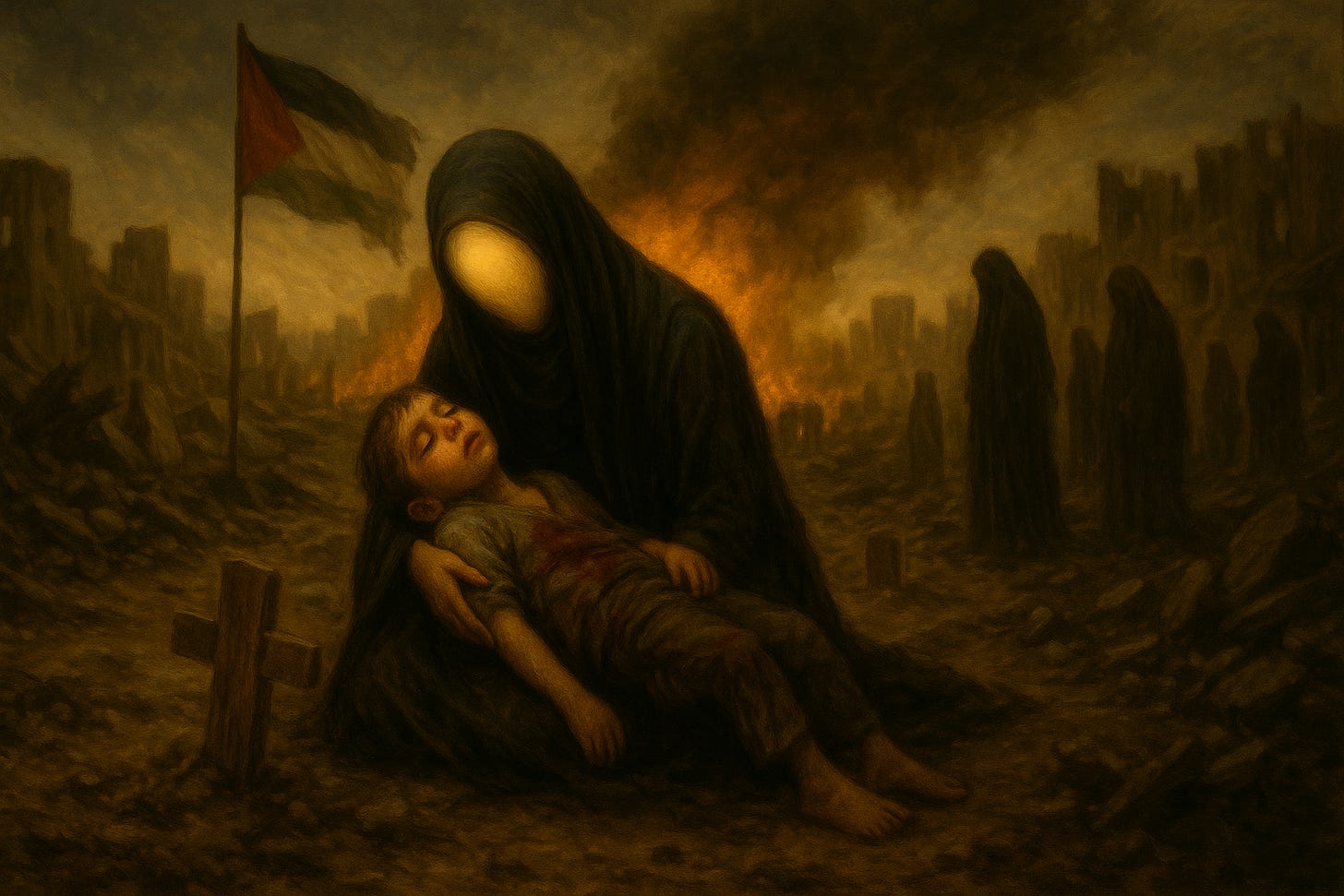[5] Arbaeen Maqtal - Ruqayya bint al-Ḥusayn and Arbaeen: A Lament for Sayyeda Sakina and the Aftermath of Karbala
This is a series of maqatil (martyrdom narratives - devotional recitations recounting the suffering and sacrifice of the Ahl al-Bayt, the family of Prophet Muhammad). These are for Arbaeen 2025/1447
In His Name, the Most High
بِسْمِ ٱللّٰهِ ٱلرَّحْمٰنِ ٱلرَّحِيمِ
ٱلْحَمْدُ لِلّٰهِ رَبِّ ٱلْعَالَمِينَ وَصَلَّى ٱللّٰهُ عَلَىٰ سَيِّدِنَا مُحَمَّدٍ وَعَلَىٰ أَهْلِ بَيْتِهِ ٱلطَّيِّبِينَ ٱلطَّاهِرِينَ ٱلْمَعْصُومِينَ، أَمَّا بَعْدُ
السَّلَامُ عَلَيْكُمْ وَرَحْمَةُ اللَّهِ وَبَرَكَاتُهُIn the name of God, the Most Gracious, the Most Merciful.
All praise is due to God, the Lord of all worlds, and may blessings be upon our Master Muhammad and upon his pure, purified, and infallible household. As for what follows:
Peace be upon you, and the mercy of God, and His blessings.
Video of the Maqtal (Eulogy)
Audio of the Maqtal (Eulogy)
1. Prelude – The Echo of Ashura
The dust of Karbala had barely settled.
Seventeen wounds on Ḥusayn’s chest still bled in every heartbeat of his little daughter. Ruqayyah—only a child—cradled the tragedy in her tiny palms,
asking the hot desert wind:
“Father, why did the Euphrates run dry when your throat was parched?”
No answer came, save the sob of the horizon.
Chains in Damascus
Night after night the moon found them—Zaynab, Ali Zayn al-Abideen, and the orphaned children chained in the courtyard of Yazid’s dungeon.
Rust-stained manacles bit into Imam Sajjād’s wrists; yet his voice, a whisper of Qurʾan, threaded through the bars.
Inside the women’s cell, Sakina soothed the younger orphans:
“Do not fear the dark; my father taught me: Allah is the Light of the heavens and the earth. A prison wall cannot eclipse His dawn.”
The guards listened. Their mothers listened through them.
Word spread: “A girl of Karbala preaches courage in the language of angels.”
In the alleyways of Shaam, women lit hidden lamps,
and the youth repeated Sakina’s lullabies as slogans of dissent.
The Sermon Behind Bars
One dawn, Zaynab bint Ali rose, chains clanging like bells of resurrection.
She addressed the city through a crack in the wooden gate:
“O people of Shaam! Know you whom you celebrate?
The son of Muḥammad lies butchered, his daughters captive,
while you deck your streets in silk!”
The marketplace froze.
Imam Sajjad followed, his frail body a testament, his words a thunderbolt:
“I am the son of the slain at Karbala.
I am the orphan of the thirsty.
If you do not recognise me, ask your spears—they remember my father’s blood.”
Their sermons lit a spark.
Mothers lamented. Young men tore the emblems of Yazīd from their turbans.
A hush of shame blanketed Damascus.
The Night of the Farewell—A Tyrant’s Restless Sleep
That night Ruqayyah could not sleep.
She clutched a blood-stained cloth—her father’s cloak—close to her face.
She dreamed of Imam Husayn.
“Come, my daughter,” he whispered, “the journey is short.”
That night, the palace of Yazīd was not a place of peace.
The marble halls echoed with a child’s sobs—
soft at first, then rising, wave upon wave,
until even the thickest walls could not muffle the sound.
Sayyeda Ruqayyah’s cries pierced the velvet darkness,
her tiny voice calling, “Baba! Baba! Where are you, my father?”
Yazid tossed upon his silken bed,
the weight of her grief pressing heavier than any crown.
He covered his ears, but the wailing grew louder,
haunting his dreams, shattering his sleep.
No music, no laughter, no distraction could drown the sorrow
of a daughter longing for her martyred father.
In desperation, Yazid summoned his guards:
“Take her the head of her father—
perhaps then she will be silent,
and I may find a moment’s rest.”
The guards, trembling, carried a covered tray
into the cold, dark cell where Ruqayyah wept.
They set it before her, and as the cloth was lifted,
the moonlight revealed the severed, beloved head of Imam Ḥusayn.
A gasp, a cry—then silence.
Ruqayyah threw herself upon her father’s face,
her tears washing the dust from his cheeks.
She spoke to him as if he could answer:
“Baba, who cut your blessed throat?
Who orphaned me in this strange land?”
Her sobs faded into a final, shuddering breath.
The prison walls bore witness:
the tyrant’s peace was bought with the last heartbeat.
Ruqayyah’s fragile chest had fallen silent against Imam Sajjad’s ribs.
A child-martyr who only wanted her father.
Zaynab’s cry—the cry that still splits the heart of Shia centuries later.
“O my brother Husayn, you gave me your daughter Ruqayyah as a trust, but alas I was unable to keep her and now I return her unto you”.
The wail that rose from the prison shattered the city’s slumber.
Even the iron-hearted felt their knees give way.
Shaam erupted—women pounding doors, youths overturning market stalls—
demanding, “Release the Household of the Prophet!”
Confronting the Tyrant
Yazid’s palace shook with the rumble of revolt.
He offered blood-money, jewels, and apologies.
Zaynab’s reply was a sword without steel:
“The reckoning for Husayn’s blood is not yours to settle—
it is a matter for my grandfather, Muhammad, the Messenger of Allah,
who will stand before you on the Day of Judgement.
There, in the court of the Almighty,
you will answer for every drop of blood spilled,
and every tear shed by the orphans and widows of Karbala.”
“We sell not the blood of Imam Husayn.
Return us our martyrs’ heads, grant us three days to mourn in Damascus,
then send us home—under God’s sky, with no favour owed to you.”
Imam Sajjad added:
“Remove the chains.
Provide guards for our protection, not your prestige.
Let the pulpit be ours; we shall speak and you shall listen.”
Cornered, Yazid agreed.
The heads were reunited with the bodies.
Black banners draped Damascus.
Three Days of Majlis in Shaam
For three nights the courtyard of the Umawi Masjid became a sanctuary of tears.
Zaynab recited the saga of Karbala;
Imam Sajjad recounted each martyr by name;
orphans sobbed in a chorus that pierced every veil of indifference.
Damascene mothers pressed their children to their hearts and vowed,
“Never again shall a tyrant raise a sword against the progeny of Fatimah.”
The Homeward Caravan
When the crescent of Safar thinned upon the sky,
the captives set out—no longer prisoners, but honoured guests of heaven.
Yazid’s own guards, humiliated yet humbled, escorted them.
Along every mile, villagers poured out with water skins and shrouds of remorse.
Arba’een—Return to Karbala
Forty nights after Ashura, the caravan reached the desolate field.
The stumps of severed flags still whispered in the wind.
Zaynab fell upon the earth where her brother’s body had lain and cried:
“O Ḥusayn! Your Zaynab has kept her promise—
the message lives, though Sakina sleeps beneath Damascus stones.”
Imam Sajjad erected simple wooden markers over each grave.
They wept until the horizon wept with them,
and the Euphrates seemed to pause, ashamed of its past silence.
The Meeting at Karbala—Jabir and the Orphaned Imam
As the caravan of the Ahl al-Bayt approached the blood-soaked plains of Karbala,
the air was thick with memory and mourning.
But on the horizon, a small group of pilgrims moved slowly,
led by an old man, blind with age but guided by love—
Jabir ibn Abdullah al-Ansari, companion of the Prophet,
the first visitor to the grave of Husayn.
Jabir’s hands trembled as he sprinkled water on his face,
his heart pounding with the weight of loss.
He called out, “Ya Husayn! Ya Husayn!”
His voice, cracked with longing, carried across the empty field.
Imam Sajjad, frail and bent by sorrow,
approached the venerable companion.
Jabir turned, sensing a presence,
and Imam Sajjad greeted him with a voice soft as the wind:
“O Jabir, I am Ali ibn al-Husayn.”
Jabir fell to his knees, tears streaming down his cheeks.
He embraced the young Imam,
his hands searching the air until they found Sajjad’s shoulders,
and he wept for the suffering written in the lines of the Imam’s face.
“O son of the Messenger’s beloved,
I have come to mourn your father,
to bear witness to the injustice,
and to offer my broken heart as a tribute to your patience.”
Imam Sajjad replied,
“O Jabir, you are the first to greet my father’s grave,
and your tears water the seeds of remembrance.
We have returned, not as victors, but as witnesses—
to tell the world what happened here,
so that no tyrant may ever silence the truth.”
The survivors and the pilgrims embraced,
their grief mingling in the dust of Karbala.
Together, they recited the Ziyarat,
their voices rising in lamentation,
a bridge between the Prophet’s era and the legacy of Karbala.
The Departure from Karbala—Rabab’s Longing
The days of mourning in Karbala drew to a close,
but the earth still trembled with the weight of sorrow.
The time came for the caravan to depart,
to leave behind the graves that held their hearts.
Sayyeda Rabab stood by the mound where Husayn rested,
her hands pressed to the soil, her tears watering the dust.
She whispered to the wind,
“O Husayn, how can I leave you here alone,
beneath the open sky, with no shade but the mercy of Allah?
How can a mother turn her back on the grave of her child,
on the memory of Sakina’s laughter, now silenced forever?”
The family gathered, urging her gently,
but Rabab’s feet would not move.
She pleaded,
“Let me remain by my beloved,
let me spend my nights beside his grave,
let me weep until the stones remember my pain.”
Imam Sajjad approached, his voice trembling with compassion:
“O Rabab, your love is a lantern for all who mourn.
But the message of Karbala must travel beyond these sands.
Your patience will teach the world what it means to love and to lose for the sake of Allah.”
With a heart torn between longing and duty,
Rabab pressed her cheek to the earth one last time.
She gathered a handful of soil,
a keepsake of her sorrow,
and rose to join the caravan—
her steps heavy, her soul forever anchored to the land of sacrifice.
As the caravan moved away,
the wind carried Rabab’s whispered farewell:
“O Husayn, O Sakina,
wait for me at the gates of Paradise,
for my heart will never leave Karbala.”
The Return to Medina—A City in Mourning
The journey from Karbala to Medina was long and heavy,
each mile echoing with memories of loss.
As the caravan neared the city of the Prophet,
Imam Sajjad paused at the outskirts,
his heart burdened with the task of breaking the news
to a city that had sent its sons and daughters to Karbala,
never to see them return.
He called for Bashir ibn Hazlam,
and entrusted him with the most sorrowful of missions:
“Bashir, go to Medina and announce the arrival of the Ahl al-Bayt,
and the martyrdom of Husayn and his companions.
Let the people know that the beloved of the Prophet
return not in triumph, but in chains and in grief.”
Bashir entered Medina, his voice trembling as he cried:
“O people of Yathrib! No place is safe for you here—
Husayn has been killed, and my eyes pour forth tears for him.
His head was severed in Karbala,
and his women and children return as captives.”
The city erupted in wails and lamentation.
Every household became a house of mourning.
Mothers rushed into the streets,
fathers tore their garments,
and children clung to their mothers,
asking for fathers and brothers who would never return.
Among the mourners was Sayyeda Umm ul-Banin,
mother of Abbas, the moon of Banu Hashim.
She stood at the door of her home,
her eyes searching every face,
her heart already knowing the answer.
When Bashir reached her,
she asked not for her sons,
but for news of Husayn:
“O Bashir, tell me of my Husayn!”
When she heard of his martyrdom,
her cries shook the heavens:
“Woe to me! All my sons are a sacrifice for Husayn.
There is no solace for a mother who has lost her Abbas,
but the pain of Husayn’s loss is greater than all.”
Yet when the tale of Karbala was told,
and the fate of Abbas reached her ears,
her grief overflowed, and she raised her voice in lamentation:
“O people of Medina, do you know how my Abbas fell?
He was the moon of Banu Hashim, the standard-bearer of Husayn.
When he rode to fetch water for the thirsty children,
his arms were severed by the swords of the enemy—
yet he pressed on, his heart beating only for his brother and for Sakina.
But when the final blow struck,
Abbas fell from his horse,
and there were no arms left to shield his noble face from the dust of Karbala.
O my son, how bitter is the fall of a lion who cannot embrace the earth,
how heavy is the sorrow of a mother who could not cradle her child in his last moments.”
Her cries shook the hearts of Medina,
and every mother wept for Umm ul-Banin,
who gave her sons for Husayn,
and whose only solace was to mourn with the bereaved.
The caravan entered Medina in silence,
the people gathering to greet them with tears and open arms.
Sayyeda Zaynab, her back bent with sorrow,
made her way to the grave of her grandfather, the Prophet Muhammad.
She fell upon the sacred earth,
her sobs mingling with the dust:
“O Grandfather, bear witness to what your Ummah has done to your beloved!
Your Husayn lies unburied in Karbala,
your daughters have been paraded through the streets as captives.”
She poured out her grief at the Prophet’s grave,
her words a river of pain and remembrance.
Then, with the dignity of a lioness,
she rose and returned to her home—
a home forever changed,
its walls echoing with the memory of Karbala,
its doors open to all who came to mourn.
The Hidden Witness—Imam Mahdi (AJTF) and the Pilgrims of Arbaeen
As the dust of centuries settled upon the plains of Karbala,
the story of Husayn did not fade—it grew,
echoing in every heart that yearned for justice,
in every footstep that traced the path from Najaf to Karbala.
On the day of Arbaeen, when the world gathers in mourning,
there is a hidden presence among the millions—
the Awaited One, Imam Mahdi (AJTF),
the living proof of Allah on earth,
walks unseen among the pilgrims,
his heart beating with the sorrow of his grandfather,
his eyes weeping for the martyrs and the orphans.
He stands at the shrine of Husayn,
his hand upon the zarih,
his lips whispering prayers for the oppressed and the faithful.
He watches the river of humanity—
old and young, rich and poor,
those who limp with wounds and those who run with longing—
all moving towards the light of Husayn.
But the Imam sees deeper than the surface.
He sees those whose hearts are aflame with love,
whose every step is a prayer,
whose tears are a testimony of loyalty.
He sees those who walk with their limbs,
but whose hearts remain unmoved,
their journey a ritual, not a revolution.
Imam Mahdi (AJTF) bears witness to every sigh,
every whispered lament,
every act of kindness on the road—
a cup of water offered, a shoulder lent to the weary,
a prayer uttered for the return of justice.
He gathers the pain of the past and the hope of the future,
knowing that the walk of Arbaeen is not just a journey of feet,
but a journey of souls—
a pledge that the message of Karbala lives on,
and that the day will come when the oppressed shall rise,
and the tyrants shall fall.
O pilgrims of Arbaeen,
know that your Imam walks with you,
counts your tears, and records your love.
He awaits the day when the world will answer Husayn’s call—
“Is there anyone to help me?”—
not with words, but with hearts awakened and hands ready to serve.
Until that day,
the walk from Najaf to Karbala remains a river of hope,
and the hidden Imam remains its silent, loving witness.
Gaza: Today’s Karbala
The dust of Karbala has never truly settled.
Its cry for justice echoes through the centuries,
finding new voices, new wounds, new deserts of sorrow.
Today, the world bears witness to another plain—
not of ancient Iraq, but of Gaza,
where children’s laughter is silenced by bombs,
and mothers cradle their martyrs beneath a sky of fire.
Gaza is today’s Karbala.
Its people, besieged and broken,
stand with empty hands and unbroken hearts,
facing the armies of oppression with nothing but faith and dignity.
Like the family of Husayn, they are denied water,
their homes turned to ashes, their loved ones taken before their eyes.
Yet, like Zaynab, their voices rise above the rubble,
bearing witness to the world:
“We will not bow to tyranny.
Our wounds are our testimony,
our tears the ink of history,
our steadfastness the banner of truth.”
In every mother who weeps for her child,
in every orphan who clings to hope,
in every youth who stands unafraid before tanks and bullets,
the spirit of Karbala lives on.
The world may turn away,
but the message of Husayn cannot be silenced—
not by swords, not by siege, not by the passing of time.
O people of conscience,
see Gaza and remember Karbala.
Let your hearts tremble at injustice,
let your tongues refuse silence,
let your hands move to aid the oppressed.
For every land where the innocent bleed,
every home where the call for justice is raised,
is a Karbala—
and every oppressor, a Yazid.
May the prayers of the oppressed rise to the heavens,
and may the promise of Husayn—
that truth will triumph,
and the blood of the innocent will never be in vain—
be fulfilled in every age,
in every Karbala,
in every Gaza.
Closing Du’a
O Lord of the oppressed,
accept these tears as you accepted the broken sighs of Ruqayyah.
Grant us hearts that tremble at cruelty
and tongues that refuse to be silent,
until every Sakina can sleep without fear,
and every Ḥusayn can rise without chains.
Ila Yawm ad-Din.


